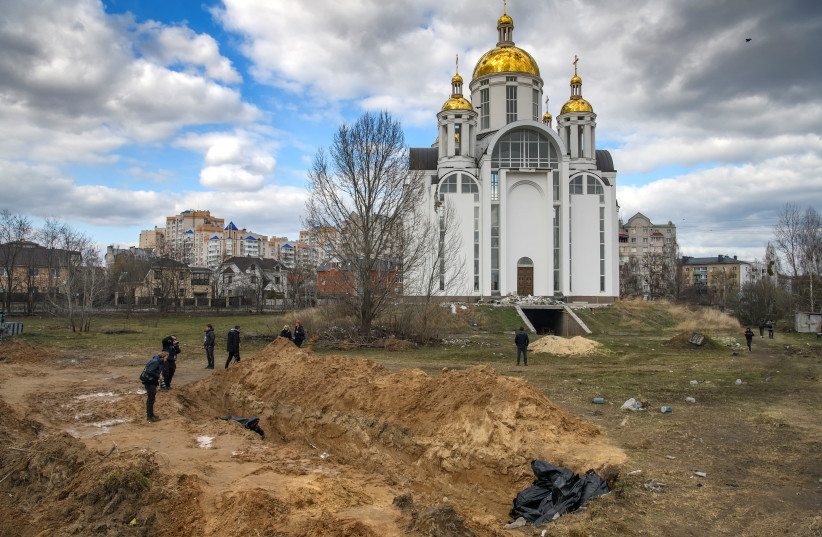Nobody knows better than Israelis the frustration and anger that builds up when other countries attempt to be “even-handed” in their approach to the conflict with the Palestinians.
How many times have we seen or heard statements by well-meaning officials – from the US or European countries following a Palestinian terror attack or an over-the-border aggression by Hamas from Gaza – that call for calm on both sides and decry fears of escalation of the conflict?
We scratch our heads and ask: “What both sides?” Those statements should be directed at the source of the problem – in those examples the terrorists or the terror organization in control of the area from which the attacks emanated.
The puzzlement and ire that we feel when such a scenario repeats itself, as it does after almost every attack against Israel, must be how Ukrainians and the rest of the world must feel if they heard the statements of Finance Minister Avigdor Liberman on Monday.
Following the horrific discovery of a mass grave and tied bodies of civilians shot at close range in Bucha, outside Kyiv, Liberman refused to condemn Russia and its leader, President Vladimir Putin.

“We all condemn war crimes,” Liberman told Army Radio in response to a question about the Bucha massacre. “There are mutual accusations here: Ukraine blames Russia, and Russia blames Ukraine.”
“We need to understand there is a bloody war there, and we need to maintain Israel’s moral position and, at the same time, our interests.”
When given a chance to backtrack later on an interview with KAN News, Liberman doubled down, only admitting that there were “difficult images” from Bucha.
“My priorities are clear… first and foremost, we have to deal with threats to Israel,” he said, moving focus to the burgeoning Iran deal that “lets the ayatollahs... earn $300 million each day from gas and oil. We will see that money in Lebanon, Gaza, Iraq and Yemen.”
Israel regularly strikes Iranian targets in Syria to prevent the Islamic Republic from entrenching itself near Israel’s northern border or transferring weapons to Hezbollah in Lebanon. Jerusalem notifies Moscow before the strikes to alert the Russian Army, which is the dominant military force in Syria.
Liberman is viewing the situation in realpolitik terms – the pragmatic approach that looks at the day after the war and the fact that Israel will still need a working relationship with Putin in order to act freely against Iranian interests in Lebanon.
That may all be true, but when stated against the backdrop of the gruesome images emerging from Bucha, it sounds callous and calculated.
Foreign Minister Yair Lapid got it right when commenting on the Bucha atrocities on Sunday.
“It is impossible to remain indifferent in the face of the horrific images from the city of Bucha near Kyiv, from after the Russian Army left,” he said. “Intentionally harming a civilian population is a war crime, and I strongly condemn it.”
Defense Minister Benny Gantz said that such condemnations of Moscow’s actions would not have an effect on Israel’s ability to defend itself against Iranian aggression from the North, saying, “We will continue to act everywhere in the Middle East where we need to act.”
If it wasn’t clear before Bucha, it certainly should be now. Israel can no longer sit on the fence and try to appear neutral as Russia continues its murderous assault on Ukraine.
History is a harsh critic, and when all of this is over, Israel will be scrutinized carefully to see whether it was on the right or wrong side during the Russia-Ukraine war.
Although Jerusalem’s humanitarian efforts to help the Ukrainian people have been exemplary, the words of our leaders will be what is remembered.
The government, especially its leader Prime Minister Naftali Bennett, must decide unequivocally which side they’re on – and then state it without ambiguity.
Bennett’s statements on Tuesday that he is “shocked by the difficult pictures and we condemn them; the suffering of the people of Ukraine is massive” is a start. Let’s hear him say “we condemn Russia and President Putin” next.
